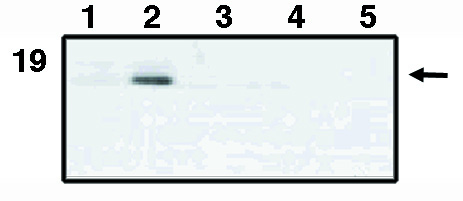Catalogue

Mouse anti Human p21 WAF-1
Catalog number: X1158M| Clone | WA-1 |
| Isotype | IgG1 |
| Product Type |
Monoclonal Antibody |
| Units | 100 µg |
| Host | Mouse |
| Species Reactivity |
Human |
| Application |
ELISA Western Blotting |
Background
p21, also known as wild-type p53-activated factor (WAF-1) or Cdk-interacting protein (CIP1), expression is predominantly induced by p53. This expression is usually in response to DNA damage caused by cytotoxic agents. The expression of p21 interrupts the cell cycle and prevents the replication of the cell containing genomic errors. p21 inhibits Cdk2, Cdk3, Cdk4 and Cdk6 to stop the cell cycle. Contained in the human p21 is a highly conserved cystine-rich region (amino acids 21-60) with a potential zinc finger domain as well as a second conserved region (amino acids 130-164) which contains several putative nuclear localization signals. p21 can also interact with proliferating cell nuclear antigen (PCNA), Gadd45, Cdk2 and cyclins which suggests it may coordinate DNA repair and replication in damaged cells.
Source
Immunogen: Hybridoma produced by the fusion of splenocytes from BALB/c mice immunized with human p21 protein and mouse myeloma SP2 cells.
Product
Product Form: Unconjugated
Formulation: Provided as solution in phosphate buffered saline with 0.08% sodium azide
Purification Method: Protein A/G Chromatography
Concentration: See vial for concentration
Applications
Detects p21 protein by Western blot at 1 to 10 µg/ml. Detects a 21 kDa protein in MCF7 cells. Can be used with either frozen or paraffin embedded tissue sections. Optimal concentration should be evaluated by serial dilutions. Other Applications: ELISA
Functional Analysis: Western Blotting
Positive Control: MCF7 cell lysate
Storage
Product should be stored at -20°C. Aliquot to avoid freeze/thaw cycles
Product Stability: See expiration date on vial
Shipping Conditions: Room Temperature
Caution
This product is intended FOR RESEARCH USE ONLY, and FOR TESTS IN VITRO, not for use in diagnostic or therapeutic procedures involving humans or animals. It may contain hazardous ingredients. Please refer to the Safety Data Sheets (SDS) for additional information and proper handling procedures. Dispose product remainders according to local regulations.This datasheet is as accurate as reasonably achievable, but Nordic-MUbio accepts no liability for any inaccuracies or omissions in this information.
References
1. Hellin, A.C., et al. Roles of Nuclear Factor-kappaB, p53 and p21/WAF1 in Daunomycin-induced cell cycle arrest and apoptosis. J. Pharmacol. Exp. Ther. 2000, 295, 870-878
2. El-Deiry, W.S., et al. WAF1, a potential mediator of p53 tumor suppression. Cell 1993, 75, 817-825
3. Xiong, Y., et al. p21 is a universal inhibitor of cyclin kinases. Nature (Lond) 1993, 366, 701-704 4. Zhang, H., et al. Proliferating cell nuclear antigen and p21 are components of multiple cell cycle kinase complexes. Mol. Biol. Cell 1993,
4, 897-906
5. Kovalic, J., et al. Int. J. Oncol. 1996, 9 (suppl.), 835
6. Shen, J., et al. ‘Identification and Validation of Differences in Protein Levels in Normal, Premalignant, and Malignant Lung Cells and Tissues Using High-Throughput Western Array and Immunohistochemistry.’ Cancer Res., 66, 11194-11206 (2006).
Protein Reference(s)
Database Name: SwissProt
Accession Number: P38936
Species Accession: Human
Safety Datasheet(s) for this product:
| NM_Sodium Azide |

Western blot analysis using mAnti-p21WAF-1 antibody at 10 μg/ml on HCT116 cells (1), HCT116 cells p53-induced with adriamycin (ADR) (2), P21-/- cells (3), p21-/- cells p53-induced with ADR (4) and p53-/- cells p53-induced with ADR (5).

